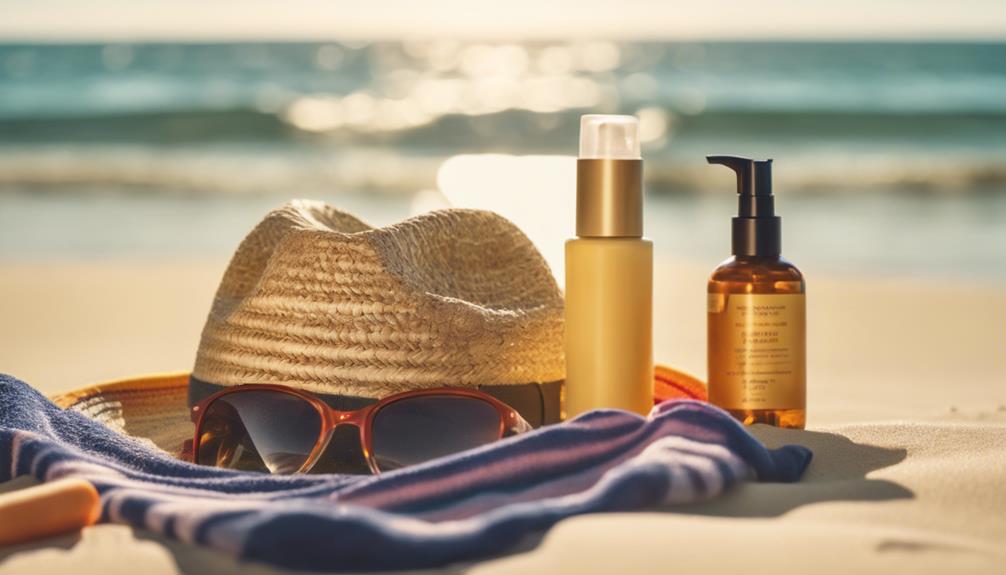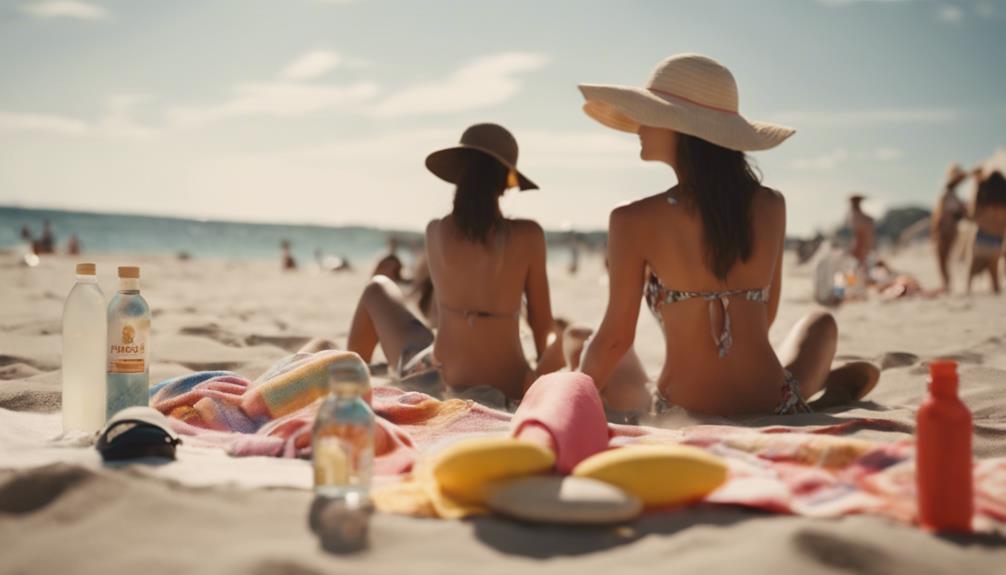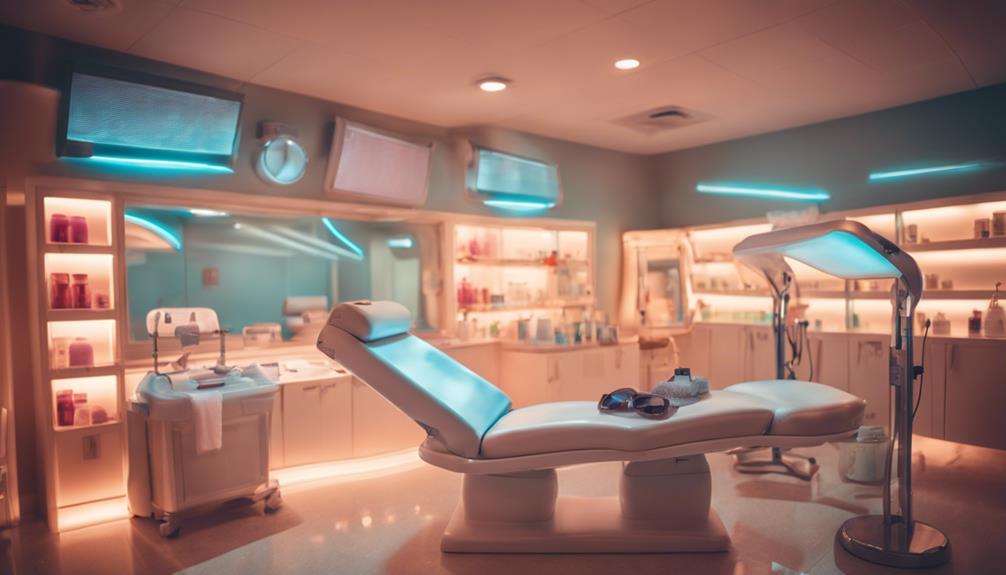If you wanna rock that sun-kissed glow and keep your skin healthy, spacing out your tanning sessions is key! Start with short sessions, around 5-10 minutes, and make sure to wait 48 hours before your next one. This gives your skin time to recover and build up melanin, which helps you get a deeper tan without the burn. Plus, staying hydrated is super important, so drink plenty of water and eat your fruits and veggies! Trust me, moderation is your friend here, and with some smart strategies, you'll get that perfect tan. Stick around to discover even more tips!
Key Takeaways
- Space tanning sessions by at least 48 hours to allow skin recovery and prevent overexposure.
- Start with shorter sessions of 5-10 minutes for fair skin to minimize sunburn risk.
- Gradually increase session duration as your skin develops melanin and adapts to UV exposure.
- Monitor your skin for redness or irritation; take breaks if needed to maintain skin health.
Understanding Your Skin Type
Understanding your skin type is essential for customizing your tanning sessions effectively.
You've probably heard of the Fitzpatrick Scale, which ranges from Type I, the fairest, to Type VI, the darkest. Knowing where you fit in can help you avoid looking like a lobster after just one session!
For example, if you're Type II, you can definitely get a nice tan, but you'll need to be careful and hydrate your skin like it's a cactus in the desert.
Remember, every skin type reacts differently, so pay attention to how your skin responds. It's all about balance—prioritizing your skin health over that instant bronze look is key.
The Role of Melanin

Melanin plays an essential role in how your skin tans and protects itself from UV damage. When you're soaking up those rays, special cells called melanocytes kick into gear, producing more melanin. This pigment gives your skin its color and serves as a shield against harmful UV rays. It's like your skin's superhero cape!
But remember, rushing the tanning process can backfire—too much UV exposure too quickly can lead to sunburn instead of that sun-kissed glow you're after. So, take it slow!
Give your skin time to build up melanin gradually. This way, you'll not only achieve a deeper tan but also keep your skin happy and healthy. Who doesn't want a fabulous tan without the pain?
Frequency and Duration Guidelines

To achieve the perfect tan, knowing how often and how long to tan is essential for your skin type and overall health.
If you've got fair skin, start with shorter sessions—around 5 to 10 minutes—and space them out every 48 hours. This way, your skin can adjust and build that beautiful melanin without turning into a lobster!
For darker skin types, you can gradually increase your session duration, but still, listen to your skin. If it's feeling a bit crispy, take a break!
Remember, patience is key; a good tan takes time. Keep your sessions consistent, and avoid cramming multiple tans into one day.
Your skin will thank you, and you'll rock that golden glow!
Risks of Overexposure

Overexposure to UV rays poses serious risks to your skin, increasing the likelihood of burns, premature aging, and even skin cancer. It's like playing with fire—sure, it might seem fun at first, but one wrong move and you're in trouble!
When you tan too much, your skin can become red and painful, reminding you that moderation is key. Plus, those fine lines and wrinkles? They'll pop up faster than you can say “sunburn.”
You might think you're winning the tan game, but overdoing it can lead to long-term damage. So, give your skin a break between sessions—after all, it's the only one you've got!
Keep it happy, and it'll thank you with a beautiful glow.
Essential Recovery Practices

Since recovery is essential for achieving a deeper, even tan, incorporating necessary practices into your regimen will help your skin heal and maintain its glow.
After tanning, give your skin a break—it's like a mini vacation! You don't want to rush things, right?
Exfoliate gently a day before your next session to keep that skin smooth and even.
Using tan extenders can be a game changer, too; they help your color last longer while keeping your skin feeling fabulous.
Don't forget to listen to your skin—if it's feeling a bit too crispy, it's time to take a breather.
Hydration for Healthy Skin

Hydration plays an essential role in maintaining healthy skin and enhancing your tanning results. When your skin's hydrated, it can better absorb UV rays and develop a beautiful, even tan. Imagine your skin as a sponge; if it's dry, it can't soak up that golden glow!
| Hydration Benefits | How to Stay Hydrated | Fun Fact |
|---|---|---|
| Softens skin | Drink plenty of water | Your skin is your largest organ! |
| Improves elasticity | Use a moisturizer | Water helps in getting a tan! |
| Enhances glow | Eat fruits and veggies | Hydrated skin fights sunburn! |
Long-term Tanning Strategies

Developing a long-term tanning strategy is essential for achieving and maintaining a healthy, vibrant glow while minimizing skin damage.
First, always listen to your skin; it's your best friend in this journey! Start with shorter sessions, especially if you're fair-skinned, and gradually increase the time as your skin adjusts.
Remember, spacing out your tanning sessions is vital—48 hours between sessions gives your skin time to recover and build melanin. In addition to spacing out your tanning sessions, it is important to always wear sunscreen with a high SPF to protect your skin from harmful UV rays. It is also beneficial to wear protective clothing, such as hats and cover-ups, while tanning. Following these skin protection tips will help prevent sunburn and long-term damage to your skin.
Also, don't forget to hydrate! A well-moisturized skin not only looks better but helps maintain your tan.
And hey, if you notice any redness or irritation, take a break! Your skin will thank you, and you'll be on your way to that stunning glow without all the stress.
Frequently Asked Questions
How Can I Tell if My Tan Is Fading?
You can tell your tan is fading if your skin appears lighter or patchy. Check for dryness or flakiness, as these signs indicate loss of color. Regular moisturization can help maintain your tan's vibrancy.
What Are the Best Products for Pre-Tanning Preparation?
For pre-tanning preparation, you'll want to exfoliate your skin, moisturize, and use a good tanning primer. These steps help achieve an even tan and enhance results, making your tanning experience more effective and enjoyable.
Can Dietary Changes Improve My Tanning Results?
Yes, dietary changes can improve your tanning results. Incorporating foods rich in antioxidants, vitamins A, C, and E, and staying hydrated will enhance your skin's health and melanin production, resulting in a more vibrant tan.
How Does Skin Type Influence Tanning Lotion Effectiveness?
Think of your skin type as a canvas; different lotions paint different results. If you've fair skin, lighter formulas may work better, while darker skin types benefit from richer, moisturizing lotions for ideal tanning effectiveness.
What Are the Signs of a Good Tanning Session?
A good tanning session leaves you with a golden glow, even color, and minimal redness. You should feel a slight warmth, not burning, and your skin should recover well, showing no signs of damage afterward.
Conclusion
So, there you have it! By spacing out your tanning sessions, you're not just chasing that sun-kissed glow; you're protecting your skin too.
Did you know that around 90% of skin aging comes from sun exposure? Yikes! That's a good reason to take it slow and let your skin recover.
Remember, a little patience goes a long way—your skin will thank you, and you'll be showing off a beautiful, even tan in no time!









